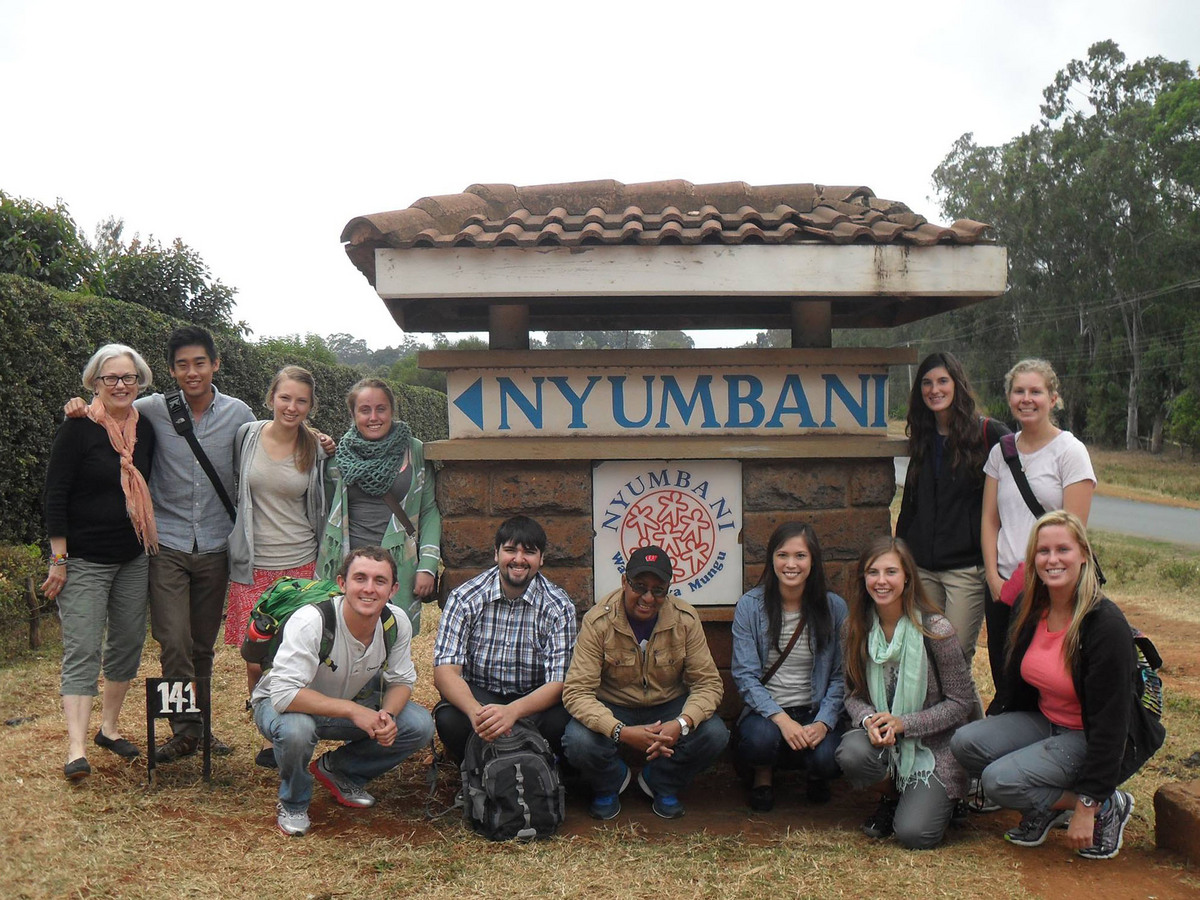Suspending Kenya travel a difficult move

Susan Gold with her global health students in Kenya in 2014.
Photo: Theo Loo
For the first time since 2007, Susan Gold, a nurse clinician at the University of Wisconsin Hospital and Clinics, won’t be heading to Kenya this year to help teens learn to live with HIV/AIDS. The 10 students who would have traveled with her in the Global Health Field Experience are making other plans in the wake of the UW–Madison decision to suspend all student travel to the country.
The Kenya decision, announced April 15, was based on a series of events, beginning with the State Department’s travel warning update in June 2014 due to increased criminal and terrorist violence. The U.S. Embassy in Kenya restricted its personnel, and the U.S. Peace Corps suspended operations. The British and Australian governments also have recently issued updated travel warnings for Kenya.
“In general, the security environment in Kenya has become increasingly less predictable during the past several months,” says Ronald Machoian, UW–Madison international safety and security director. He noted especially an increasing pace of violence from Al-Shabaab, a Somalia-based terrorist organization that attacked Garissa University in April.
“The suspension of student travel to Kenya grows from a serious concern that continuing violence there presents circumstances that are no longer in acceptable balance with potential academic gains.”
Jolanda Vanderwal Taylor
This would have been the fourth year that Gold led a global health trip that introduces American and Kenyan students to each other, shows UW–Madison students the context of HIV in Kenya and teaches Kenyan teens more about sexuality, immunology and dignity.
“I fully respect the situation the university is in,” Gold says. “I always consider the university partners in the program. We all have the ultimate goal of keeping the students safe.”
The student travel suspension affects two field courses, their 20 students and other students engaged in independent study projects.
“Decisions to curtail or suspend our presence are made once it has been determined that the level of risk in a location begins to diminish the likelihood of successful learning experiences,” Machoian says. “Education at UW–Madison should not become a threat to students’ or employees’ well-being.”
UW-Madison policy precludes student travel to locations under a U.S. Department of State or Centers for Disease Control and Prevention travel warning. That meant general student travel to Kenya had been suspended prior to the April 15 announcement. The field courses went forward under a specific waiver through the university’s travel process, Machoian says.
Campus study abroad offices, Machoian and the University International Travel Committee (UITC) work together to monitor events across the world and review the safety and security of locations under travel warnings. After considering conditions in Kenya, the UITC recommended the suspension to the vice provost for international studies.
“Our baseline presumption always has to be, while we are committed to education and service, our first priority has to be keeping students and faculty safe.”
James Conway
“The UITC is truly there to help the campus address risk in planning international education and research experiences,” says Jolanda Vanderwal Taylor, professor and chair of the Department of German and co-chair of UITC. “The suspension of student travel to Kenya grows from a serious concern that continuing violence there presents circumstances that are no longer in acceptable balance with potential academic gains.”
Because global health field experiences are designed to introduce students to health disparities throughout the world, they often include visits to marginalized countries, says James Conway, associate director for health care at the Global Health Institute (GHI) and a member of the University International Travel Committee. GHI has monitored these kinds of situations for several years.
“Our baseline presumption always has to be, while we are committed to education and service, our first priority has to be keeping students and faculty safe,” he says.
Gold’s work in Kenya began in 2003, when she lived and volunteered for two months in an AIDS orphanage. She returned in 2007 with a Fulbright grant that allowed her to develop a curriculum to help teens who had once been expected to die live with HIV/AIDS. Testing showed that her classes increased teens’ knowledge of the disease and their self-esteem, as they learned they could lead long, healthy, normal lives.
“Everyone involved in international education at UW–Madison strongly hopes that this environment will improve soon, for the good of Kenya and the region.”
Ronald Machoian
The first UW–Madison students joined Gold in 2012, teaching the curriculum and roleplaying with the Kenyans. In socializing together, the African and American students learned they all had the same questions: “Am I normal? Will somebody love me? Do I have a future?”
“The recognition of that is very powerful on both sides,” Gold says.
The university plans to review the suspension in six months, Machoian says. “Everyone involved in international education at UW–Madison strongly hopes that this environment will improve soon, for the good of Kenya and the region,” he says.
Gold hopes to resume the program that is built on years of relationships. “It would be a terrible loss for this program to be lost,” she says. “It would affect so many people on both sides of the world.”
—Ann Grauvogl
Tags: Africa, international, student resources
